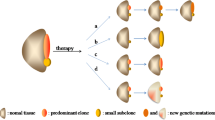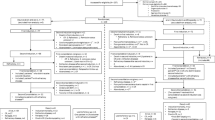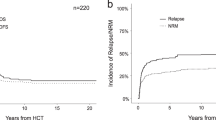Abstract
The approach to treatment of acute myeloid leukemia is substantially influenced by the age of the patient. Younger patients who are arbitrarily defined as those being <60 years, although comprising the minority of all patients with the disease, will always receive an intensive approach, whereas in older patients, an initial decision as to whether an intensive approach is appropriate or not has to be made. Standard chemotherapy for many years has been ‘3+7’, followed by consolidation with high-dose Ara-C at a daily dose level of 3 g/m2. It remains unclear as to what number of total treatment courses is optimal. Alternatives to this standard of care will be considered.
This is a preview of subscription content, access via your institution
Access options
Subscribe to this journal
We are sorry, but there is no personal subscription option available for your country.
Buy this article
- Purchase on Springer Link
- Instant access to full article PDF
Prices may be subject to local taxes which are calculated during checkout
Similar content being viewed by others
References
Fernandez HF, Sun Z, Yao X, Litzow MR, Luger SM, Paietta EM et al. Anthracycline dose intensification in acute myeloid leukemia. N Engl J Med 2009; 361: 1249–1259.
Lowenberg B, Ossenkoppele GJ, van Putten W, Schouten HC, Graux C, Ferrant A et al. High-dose daunorubicin in older patients with acute myeloid leukemia. N Engl.J Med 2009; 361: 1235–1248.
Lee JH, Joo YD, Kim H, Bae SH, Kim MK, Zang DY et al. A randomized trial comparing standard versus high-dose daunorubicin induction in patients with acute myeloid leukemia. Blood 2011; 118: 3832–3841.
Pautas C, Merabet F, Thomas X, Raffoux E, Gardin C, Corm S et al. Randomized study of intensified anthracycline doses for induction and recombinant interleukin-2 for maintenance in patients with acute myeloid leukemia age 50 to 70 years: results of the ALFA-9801 study. J Clin Oncol 2010; 28: 808–814.
Ohtake S, Miyawaki S, Fujita H, Kiyoi H, Shinagawa K, Usui N et al. Randomized study of induction therapy comparing standard-dose idarubicin with high-dose daunorubicin in adult patients with previously untreated acute myeloid leukemia: the JALSG AML201 Study. Blood 2011; 117: 2358–2365.
Petersdorf S, Kopecky K, Stuart RK, Larson RA, Nevill TJ, Stenke L et al. Preliminary results of Southwest Oncology Group Study S0106: an international intergroup phase 3 randomized trial comparing the addition of gemtuzumab ozogamicin to standard induction therapy versus post-consolidation gemtuzumab ozogamicin versus no additional therapy for previously untreated acute myeloid leukemia. Blood 2009; 114: 326–327.
Burnett AK, Hills RK, Milligan D, Kjeldsen L, Kell J, Russell NH et al. Identification of patients with acute myeloblastic leukemia who benefit from the addition of gemtuzumab ozogamicin: results of the MRC AML15 Trial. J Clin Oncol 2011; 29: 369–377.
Castaigne S, Pautas C, Terre C, Raffoux E, Bordessoule D, Bastie J-N et al. Effect of gemtuzumab ozogamicin on survival of adult patients with de-novo acute myeloid leukaemia (ALFA-0701): a randomised, open-label, phase 3 study. Lancet 2012; 379: 1508–1516.
Burnett AK, Russell N, Hills RK, Kell J, Freeman S, Kjeldsen L et al. The addition of gemtuzumab ozogamicin to induction chemotherapy improves survival in older patients with acute myeloid leukaemia. J Clin Oncol 2012 (in press).
Hołowiecki J, Grosicki S, Kyrcz-Krzemien S, Skotnicki AB, Piatkowska-Jakubas B, Warzocha K et al. Daunorubicin, cytarabine and fludarabine (DAF) for remission induction in relapsed or refractory acute myeloid leukemia. Evaluation of safety, tolerance and early outcome—Polish Adult Leukemia Group (PALG) pilot study. Ann Hematol 2008; 87: 361–367.
Holowiecki J, Grosicki S, Giebel S, Robak T, Kyrcz-Krzemien S, Kuliczkowski K et al. Cladribine, but not fludarabine, added to daunorubicin and cytarabine during induction prolongs survival of patients with Acute Myeloid Leukemia. Multicenter, Randomized Phase III Study. J Clin Oncol; e-pub ahead of print 16 April 2012.
Mayer RJ, Davis RB, Schiffer CA, Berg DT, Powell BL, Schulman P et al. Intensive postremission chemotherapy in adults with acute myeloid-leukemia. N Engl J Med 1994; 331: 896–903.
Burnett AK, Milligan D, Goldstone A, Prentice A, McMullin MF, Dennis M et al. The impact of dose escalation and resistance modulation in older patients with acute myeloid leukaemia and high risk myelodysplastic syndrome: the results of the LRF AML14 trial. Br J Haematol 2009; 145: 318–332.
Brune M, Castaigne S, Catalano J, Gehlsen K, Ho AD, Hofmann WK et al. Hellstrand. Improved leukemia-free survival after postconsolidation immunotherapy with histamine dihydrochloride and interleukin-2 in acute myeloid leukemia: results of a randomized phase 3 trial. Blood 2006; 108: 88–96.
Author information
Authors and Affiliations
Corresponding author
Ethics declarations
Competing interests
The author has received consulting fees and grant support from Genzyme. This article was published as part of a supplement that was supported by Novartis, MSD Italia, Roche, Celgene, GlaxoSmithKline, Sanofi, Gilead, Adienne, Italfarmaco, Pierre Fabre Pharmaceuticals with an unrestricted educational contribution to AREO—Associazione Ricerche Emato-Oncologiche (Genoa) and AMS—Associazione Malattie del Sangue (Milan) for the purpose of advancing research in acute and chronic leukemia.
Rights and permissions
About this article
Cite this article
Burnett, A. Optimal induction and post-remission therapy for acute myeloid leukemia. Leukemia Suppl 1 (Suppl 2), S14–S15 (2012). https://doi.org/10.1038/leusup.2012.10
Published:
Issue Date:
DOI: https://doi.org/10.1038/leusup.2012.10



